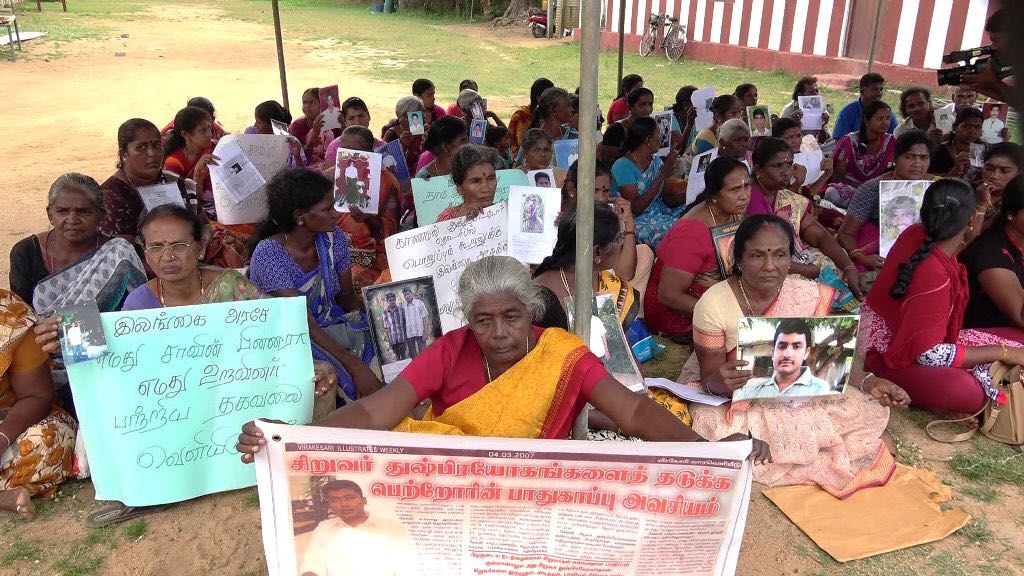#SriLanka must take meaningful action to determine fates & whereabouts of tens of thousands of people who have been subjected to enforced disappearance over the decades.
— UN Human Rights (@UNHumanRights) May 17, 2024
Accountability must be addressed - @volker_turk on @UNHumanRights report
In a new report, the Office of High Commissioner for Human Rights (OHCHR) states that the risk of future enforced disappearances remains today as Sri Lanka has failed to “tackle structural weaknesses and to undertake necessary reform.”
Sri Lanka is known to have the second largest number of enforced disappearances in the world. The report highlights that from the 1970s to 2009, there were “several waves of enforced disappearances.”
Tamil families of the disappeared have been campaigning for years to know the fate of their forcibly disappeared relatives, many of whom surrendered to Sri Lanka’s military in May 2009 during its genocidal offensive on the No Fire Zones.
The Tamil families of the disappeared have been routinely subjected to harassment, intimidation, surveillance and violence by the state’s security forces during their search for justice. Despite this, they have been engaging in continuous roadside protests across the North-East.
As part of their work on accountability in Sri Lanka, the OHCHR conducted a series of interviews with 39 victims. From the interviews, the OHCHR found that for the families of the disappeared, knowing the truth of the fate and whereabouts of their relatives was the “utmost priority”. The families have continuously demanded that Sri Lanka release a list of all of the people they have taken into government custody or held in camps at the end of the armed conflict.
The interviewees also expressed a “strong desire” for the perpetrators to be held criminally liable and expressed support for the international community to use universal jurisdiction and refer Sri Lanka to the International Criminal Court (ICC) to achieve justice and accountability.
Tamil families of the disappeared have always expressed their distrust and lack of confidence in domestic accountability mechanisms as none have provided any meaningful answers or accountability. In 2016, Sri Lanka established the Office of Missing Persons (OMP) to 'investigate' enforced disappearances. Although seven years have passed, the OMP has not thoroughly investigated a single case. Speaking to the Tamil Guardian in 2022, Tamil families of the disappeared said that the Office of Missing Persons is an "inactive mechanism" .
The OHCHR's report states that the OMP has taken an "administrative 'case management approach', with preliminary inquiries focused on the eligibility of victim families to financial assistance, rather than carrying out thorough investigations to clarify the fate and whereabouts of individuals."

The families also told the OHCHR that financial compensation offered as reparations by the state, needed to be accompanied with acknowledgement of responsibility. The OHCHR stated that many of the families said that reparation payments “were a tool to divert attention away from justice and to buy people’s silence.”
The OHCHR has highlighted “gaping deficits” in domestic accountability mechanisms in Sri Lanka. The report further notes that despite a series of domestic commissions, successive Sri Lankan governments have failed to implement the recommendations from previous initiatives. This has led to deep scepticism from Tamil victim-survivors and civil society organisations.
Given the failure of domestic mechanisms, the latest report makes a range of recommendations to Sri Lanka and the international community to address the “continuing accountability deficit for enforced disappearances.”
In their recommendations, the OHCHR has explained that individual states can exercise the principle of universal jurisdiction to investigate and prosecute individuals responsible for enforced disappearances in Sri Lanka.
The OHCHR has also called for “targeted sanctions” including asset freezes and travel bans on Sri Lankan officials credibly accused of war crimes.
The USA and Canada have already placed travel bans on some officials. In 2020,the former head of the army Shavendra Silva was barred from entering the US has been barred from entering the country “due to credible information of his involvement, through command responsibility, in gross violations of human rights”.
Last year, Canada placed sanctions on former president Mahinda Rajapaksa and former defence secretary Gotabaya Rajapaksa for “ gross and systematic violations of human rights.”
The OHCHR also recommends “more rigorous application of screening procedures” for Sri Lankan personnel who are deployed on UN peacekeeping missions.
Sri Lanka’s forces continue to be deployed although they have committed human rights abuses both at home and abroad.. In 2007, over 100 Sri Lankan peacekeepers were implicated in a child sex ring in Haiti. Sri Lankan troops were accused of exchanging food and money for sex with girls and boys as young as 12. While most of the accused were repatriated, none have been criminally prosecuted.
The report also recommends individual states to to use their powers to refuse accreditation or recognition of ambassadors or other senior diplomatic staff if they have been implicated in human rights abuses.
Read the full report here.
